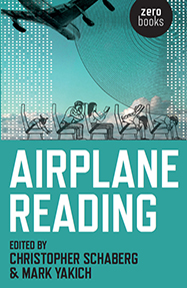Future wife and I were waiting at SFO to catch a post-Christmas flight back to Edinburgh, Scotland, where we lived at the time. It was the second leg of a lengthy tour to meet both our families: first my mother in Victoria, BC, and then her oldest sister, standing in for the mom she had recently divorced after one too many family blowouts, in Gilroy, California. The holidays had passed without serious incident and we were cleared for matrimony the following September.
Cleared for marriage, but not for takeoff. The departures board was showing a snow delay at Heathrow. Outright cancellation followed a few hours later. We greeted this news with an emotional sequence that went: indignation, resignation, relief. Relief because we didn’t have to wait anymore, and we were in no hurry to exchange California for dull, freezing Scotland. We had booked with a good airline, for once, and they offered us a hotel. This seemed like a grand luxury after two weeks of improvised bedding in family guest rooms. We could even stay two nights if we wanted.
We sauntered off a few paces to discuss the matter, and then returned to announce that we would take two nights. There was another, unannounced part of the plan: that we would not contact friends or, especially, local relatives. Our obligations had been fulfilled: this leg of our trip would be a pre-wedding honeymoon. I called to cancel my slot at an academic conference in Glasgow, and she called her boss to register her absence. Then we boarded the little bus and celebrated our arrival at the Airport Marriott with umbrella cocktails on the patio of the hotel bar. It rained, but we decided that was what the little umbrellas were for.
The weird thing about airport hotels is that they are full of airport staff. I don’t know if this is always the case, but during our stay the bar, restaurant, lobby, and elevators were fully stocked with men and women in uniform. Their colors and wing markings seemed to indicate rank and corporate allegiance. They swapped jabs at each others’ companies under the guise of false smiles. The other guests were uniformed to such an extent that I remember feeling distinctly uncomfortable in civilian clothes. Each passing visage, the men and the women alike, bore the dull sheen of heavy makeup under a sturdy roof of hairsprayed bouffant. There was a lot of manmade fabric, too, from the stain-resistant Olefin carpets to the polyamide microfiber crew suits. In this context, I could see the wisdom of the smoking ban that had been passed recently in California.
On our first day we did everything our logical minds told us to: we rode the BART into San Francisco, walked around the city, drank a lot of coffee, ate at a good Vietnamese place, and saw all the sights. Though neither of us could say why, this bonus day of tourism tacked on to the end of our trip was exhausting and slightly underwhelming. We returned to the anonymity of the Marriott at dusk and ate a meal of oily vegetarian-option pasta in the Applebees next door.
The kitsch value of the airport holiday was wearing thin. We sniped at each other over dinner. We argued about whose family had been more exhausting to deal with, and whose work was suffering more by our prolonged absence. Then we made up, and when we got back to our ticky-tacky room we tried to breathe some animal warmth into it with exaggerated gestures of lovemaking. After 40 minutes of breathy flight attendants and handsome pilots in steamy stopover scenarios, we slept.
The next day we broke out of the familiar feeling of obligation that plagues most holidays. We swapped our guilt and our slavish obedience to clock time for spontaneity and embraced the moment. Our flight was at five o’clock that evening. We got to the airport right after breakfast and stowed our bags and still had seven hours to kill.
We decided to check out the neighborhood. We left through the automatic doors and started down the highway, taking a smaller road at the first exit. Being on foot in the land of cars and shuttles was awkward, dangerous, and possibly even illegal, but we kept walking. We walked past razor-wire fences, studied patterns of debris in the ditches, and stood aside holding hands as anonymous traffic roared past. There were no bicycles, no sidewalks, no public parks, no residential housing of any kind. There were warehouses and self-storage buildings, a few chain restaurants, and lots of empty space.
But this no man’s land was far from barren. The warm winter sun, hidden behind clouds for much of our visit, now set us free: we stripped to our t-shirts and picked wild flowers by the roadside, fashioning daisy chains and boutonnières. After the bleak midwinter of Scotland this seemed an enchanted, if slightly post-apocalyptic, tropical paradise. When we reached the perimeter of the runway area we found that the planes shared the land with a bird sanctuary, and we stood at the fence watching cormorants, loons, and herons, hunting and diving, pursuing mates, fighting with rivals, all amid the constant disruption of takeoffs and landings. We kissed for a long time at the fence and then started our walk back to the terminal, knowing we had passed a more important test than the banter with relatives and all the hurdles of the previous week. We knew that we approved of each other.
Julian Hanna was born in Vancouver. He is on the faculty of the Madeira Interactive Technologies Institute. His work has appeared in Journal of Modern Literature, Modernism/Modernity, European Journal of English Studies, Journal of Wyndham Lewis Studies, Cine Qua Non, and elsewhere. He has also written a guide to modernism, Key Concepts in Modernist Literature (Palgrave, 2009), and helps to curate the Madeira Story Generator.






